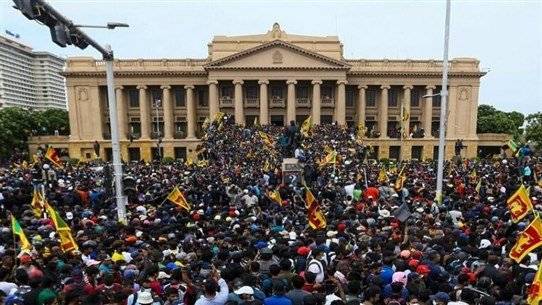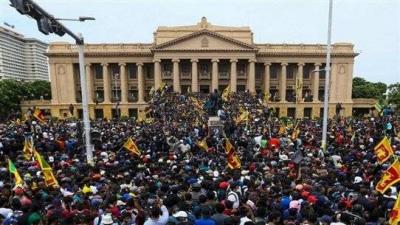The situation in Sri Lanka remains unclear, as President Gotabaya Rajapaksa agreed to resign this week after being forced to flee his palace, which was stormed by crowds following massive protests in Colombo. The United States urged the country's future leaders to "act swiftly" to find solutions to the deteriorating economic conditions, "including shortages of electricity, food, and fuel," according to a State Department spokesperson.
In a televised statement, Sri Lankan Parliament Speaker Mahinda Yapa Abeywardena said, "The president has stated he will resign on July 13 to ensure a peaceful transition of power." Two close associates of the president have resigned: the head of the press service, Sudewa Hettiarachchi, and the Minister of Information, Bandula Gunawardena, who also stepped down from his position leading the presidential party.
Sri Lankan Prime Minister Ranil Wickremesinghe, the next in line to succeed Rajapaksa, immediately called for an emergency government meeting to seek a "swift solution" to the crisis, inviting political party leaders to join. He expressed his willingness to resign to make way for a national unity government. However, this stance did not succeed in calming the protestors, who stormed the Prime Minister's residence and set it on fire.
President Rajapaksa, 73, managed to escape just minutes before hundreds of demonstrators entered the presidential compound, which is usually designated for receptions but he moved into in April after his private residence was stormed. Soldiers guarding the official residence fired into the air to deter the demonstrators until the president and his entourage were evacuated aboard a naval vessel heading toward the island's southern waters. A military source indicated that Rajapaksa is expected to arrive on Sunday at the Trincomalee naval base in the northeast of the island.
After midnight on Saturday, Chief of Staff General Shavendra Silva called for calm via television screens, affirming that "there is a possibility to resolve the crisis peacefully and constitutionally." The National Hospital of Colombo, the main hospital in the capital, reported receiving 105 injured people following the protests on Saturday, while 55 were still receiving treatment on Sunday. Among the injured are 7 journalists. Hospital spokesperson Pushpa Suisha stated that "one person is in very critical condition after being shot."
Protesters occupying the presidential palace declared they would not leave until the president officially resigns. Student leader Lahiru Wyrasikara stated, "Our battle is not over yet," adding, "We will not give up this fight until he actually leaves."




